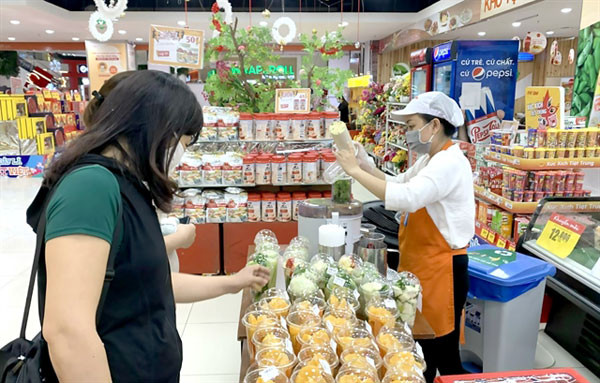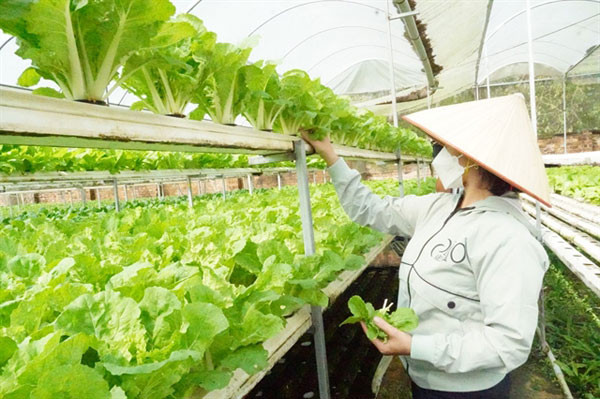
The fake organic food is sold at double or even triple the price of non-organic labelled food.
Nguyen Minh Hiep, a woman living in Go Vap District, HCM City, said: "Believing in the advertising and reputation of businesses, and worrying about family's health, everyone wants to choose safe and clean food - me too. So I have been choosing clean food at stores for three years now. Although the price is higher than in the market, I believe in the label of clean food. So I still accept to buy it for peace of mind."
However, recently a report said that vegetables taken from the wholesale market were attached to VietGAP (Vietnamese Good Agricultural Practices) standards and then taken into the modern retail distribution system.
The report has made Hiep and many other consumers lose faith in the words 'organic vegetables' from businesses.
"Losing faith is only one problem, but another more important is who will be responsible for the health and interests of consumers when everyday customers spend large amounts of money to buy organic food," said Hiep.
Difficult to distinguish
Vo Minh Tri, director of a company providing organic fruit and vegetables in HCM City, said that whether food is organic depends on the process of growing vegetables from the nursery and planting without pesticides and growth promotion drugs.
Transportation and preservation must also be without banned substances.
The current difficulty is that authorities do not have the capacity to inspect and control vegetable and fruit products sold on the market.
For example, the farming stage is strictly controlled with organic products, but when it comes to preservation, too many banned substances and preservatives are used. As a result, it could not be labelled as an organic product when it reached consumers.
"On the other hand, HCM City is only a place to consume agricultural products, while vegetables and fruits are grown in other provinces, so food control is quite difficult," said Tri.
"Food supply system in HCM City only meets about 20-30 per cent of the people's needs, the rest mainly from other places or imported, so food safety and hygiene also depends on other provinces," he said.
Vu Thi Thoa in Thu Duc City said that she often buys vegetables at supermarkets to ensure her family's health.
Consumers can not distinguish organic vegetables from others on their own, so they must rely on information and traceability stamps on product packaging, she said.
Doctor Nguyen Thi Lam, former deputy director of the National Institute of Nutrition, said that organic food does not contain harmful or dirty substances and does not directly affect or cause unforeseeable consequences for the users' health. These harmful substances have been announced and carefully tested by competent authorities.
Nguyen Van Duc Tien, director of the HCM City Plant Protection Sub-Department, said that at present, the city controls the quality of clean vegetables produced by agricultural cooperatives in the city.
As for the products from other localities and distributed to HCM City, it was not easy to control, he said.
Commercial fraud

Speaking about the recent incident in which market vegetables were labelled as VietGAP standard ones and then taken into the modern retail distribution system, Pham Khanh Phong Lan, head of the HCM City Food Safety Management Board, said this was unacceptable commercial fraud.
The fraud also greatly affected genuine businesses and manufacturers that have set up organic production systems for a long time to gain a foothold in the market.
It caused discredit for genuine businesses and loss of consumers' belief.
However, Lan said it was difficult to control organic food.
"Challenges posed for people making "clean" food is how to keep the standards as committed while they must face price pressure and market competition," said Lan.
In addition, Lan said, market vegetables could not be attributed to non-organic vegetables. Whether food is sold in the market or the supermarket still has to be tested by a competent agency, and it can be sold on the market only when it meets standards.
The difference is that the supermarkets had a more professional management system, making it easier to control and test inputs. Although there is a management system in traditional markets, there is a lack of human resources, so it is more difficult to manage.
The HCM City Food Safety Management Board annually inspects about 20,000 food-related units.
"All must be responsible for ensuring food safety for consumers," said Lan.
Many modern retailers have tightened input selection regulations to manage food manufacturers, in which safety is always the top priority.
Nguyen Ngoc Thang, operation director of the Co.opmart chain, said that the unit regularly assessed the production process, food hygiene, and safety conditions at facilities that supply goods for the chain.
Before being put into the chain, the product will undergo tests for some antibiotic criteria, a quick test for pesticide residues, microbiological criteria, and bioactive and bleaching agents.
The Saigon Co.op's laboratory has a minimum test capacity of 24,000 samples annually.
Retail stores such as Co.opXtra and Co.op Food are also equipped with specialised equipment for quality control staff to check the input goods quickly. All unsatisfactory products will be removed from the shelves immediately.
Experts said sampling for inspection and analysis was crucial in serving food safety supervision. However, the actual number of samples to be tested is still limited. The quick test results only screen for some basic active ingredients, not an in-depth test.
Intensive testing requires many days to give results, while fresh food has a short life.
Pham Khanh Phong Lan said that in recent years, testing foods in HCM City had 95 per cent of satisfactory results and only five per cent of violations. As for products in the safe food chain, the rate is 97 per cent.
Lan said synchronous solutions are required from the central to the grassroots level to control safe food better. A food safety inspection should be carried out regularly, periodically, and more deeply.
In the context of information technology strong development, it is necessary to innovate, strengthen scientific research, and apply technology, and digital transformation in food safety management, she said.
Source: Vietnam News